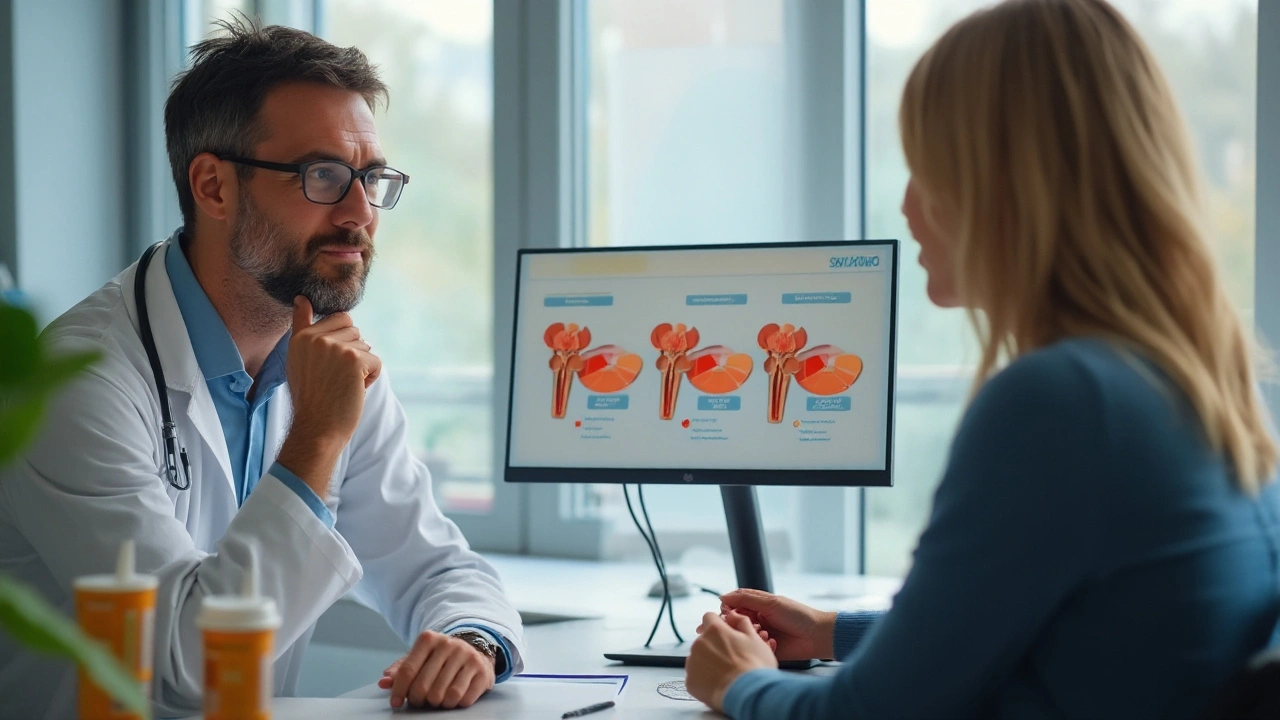When managing hypothyroidism, Synthroid is often the go-to prescription. However, it is not the only choice available for thyroid hormone replacement. Patients seeking alternatives may consider both synthetic options and natural extracts, each carrying its own set of pros and cons.
Choosing the right medication can have a significant impact on your thyroid health, so exploring these alternatives might offer a tailored fit for your individual needs. Let's navigate through some of the most common alternatives and understand what they bring to the table.
- Levothyroxine
- Armour Thyroid
- Cytomel
- Thyrolar
- Nature-Throid
- Liothyronine (T3) and Levothyroxine (T4) Combination
- Conclusion
Levothyroxine
Levothyroxine stands as one of the most common and well-known alternatives to Synthroid, acting as a consistent choice in the realm of thyroid hormone replacement therapies. This medication, a generic equivalent of Synthroid, contains the active ingredient known scientifically as synthetic thyroxine or T4. One of the significant advantages of Levothyroxine is its widespread accessibility across pharmacies globally, and it often comes at a reduced cost compared to its branded counterpart, making it an attractive option for numerous individuals.
When it comes to treating hypothyroidism, Levothyroxine is as versatile as it is widely prescribed. Patients have the flexibility to choose from various formulations, including tablets, capsules, and even injectable forms for acute medical settings, such as myxedema coma, a serious manifestation of hypothyroidism. The medication works by replenishing absent or deficient levels of thyroid hormone in the body, which can help in normalizing metabolic activities and relieving symptoms like fatigue, weight gain, and cold sensitivity.
However, switching between brands or forms can sometimes be a bit tricky due to potential changes in absorption and bioavailability – a point stressed by endocrinologists alike. Differences in the formulation's inactive elements between generic and branded versions may necessitate dose recalibration. In consistent therapeutic management, healthcare providers frequently conduct blood tests to monitor thyroid hormone levels to ensure efficacy and safety, adjusting dosages in response to the readings.
Many patients starting on Levothyroxine report gradual symptom improvement, although it may take several weeks of regular dosing to notice full effects. Interestingly, some cases cite varying responses to different generic versions, a testament to the individualized nature of thyroid disease treatment. This variability can sometimes pose challenges, but it also underscores the need for personalized patient care. In an expert review by the American Thyroid Association, it has been highlighted that stable brand consistency is crucial for maintaining proper therapeutic levels, hinting that patients should ideally stick to the same brand or generic whenever possible for continuity.
“Consistency is key in thyroid treatment,” contends Dr. Michelle Petrovic, an acclaimed endocrinologist, emphasizing that, “Patients must work closely with their healthcare providers to find the right balance that works for them.”
Levothyroxine's efficacy in reducing symptoms and regulating thyroid hormone levels also makes it a preferred treatment during pregnancy, provided that careful monitoring of thyroid function is maintained. The hormones play an indispensable role in fetal development, particularly in brain maturation, which further showcases the importance of correctly adjusted supplementation. Mismanagement or untreated cases of hypothyroidism during pregnancy could lead to complications, both for mother and child, illustrating the critical nature of this intervention.
Armour Thyroid
Armour Thyroid is an intriguing alternative to synthetic thyroid medications, drawing its origins from natural sources. This medication is derived from the dried and powdered thyroid glands of pigs, offering a blend of both T4 (thyroxine) and T3 (triiodothyronine) hormones. Many patients find it particularly appealing because it mimics the natural hormone composition more closely than synthetic versions, which typically contain only T4. This dual hormone approach can be beneficial for those who have not found relief with T4 alone, as the natural ratio of hormones aims to address various symptoms associated with hypothyroidism.
While the use of desiccated thyroid extracts like Armour Thyroid dates back to the late 1800s, it still sparks debate within the medical community. The lack of FDA approval gives rise to concerns about manufacturing consistency and quality. However, many swear by its efficacy, citing improved energy levels and overall well-being compared to synthetic alternatives. Dr. Laurie Eberhart, an endocrinologist, notes,
"Some of my patients have responded remarkably well to Armour Thyroid, especially those who've struggled with typical synthetic medications."This endorsement from a reputable source might be enough to sway some towards this natural option.
Despite its popularity, Armour Thyroid comes with its set of challenges. One of the primary concerns is the potential for inconsistent dosing due to variations in the natural source. Every batch might differ slightly, which can impact hormone levels in the body. This inconsistency necessitates regular monitoring and potential dose adjustments to ensure optimal thyroid function. Additionally, some patients may experience increased side effects such as palpitations, nervousness, or weight changes due to the inclusion of T3, which is quicker acting and more potent than T4.
Pros
- Potentially beneficial for patients unresponsive to synthetic T4 alone.
- Contains both key thyroid hormones, T3 and T4.
- Provides an alternative for those sensitive to synthetic hormones.
Cons
- Not FDA-approved, raising concerns about regulation and consistency.
- Inconsistent dosing may lead to fluctuating hormone levels.
- Potential for increased risk of side effects and toxicity.
Those considering Armour Thyroid should engage in thorough discussions with their healthcare provider. The choice to switch to or start this treatment should involve consideration of personal health history, preferences, and the ability to commit to regular blood tests to monitor its effect. Ultimately, like all medications, it serves some better than others. It remains an option worth considering for individuals seeking a more 'natural' composition in their thyroid medication journey.

Cytomel
Cytomel, also known by its generic name Liothyronine, stands out in the landscape of thyroid hormone replacement as a synthetic T3 medication. Unlike levothyroxine, which offers a steady supply of the precursor hormone T4 to your body, Cytomel provides the active T3 hormone directly. Because of its rapid absorption rate, Cytomel is often considered for patients who have trouble converting T4 to the active T3 themselves. This can sometimes mean a beneficial impact, particularly when tackling symptoms that persist despite traditional T4 therapies. The faster action might quickly elevate T3 levels, offering relief from fatigue and mental fog common in hypothyroid patients.
Despite its benefits, Cytomel requires careful handling due to its swift absorption and potential side effects. It is typically not recommended as the first line of treatment, usually reserved for individuals who don't respond sufficiently to T4 alone or who may have specific conditions that affect T3 conversion. The potential for toxicity means that patients typically undergo routine blood tests to ensure they are maintaining safe and effective levels. Some practitioners prefer to start with a low dose and gradually increase it, observing patient response closely. This method helps in achieving a balance that maintains benefits while minimizing risks, which can range from palpitations to more severe cardiac effects.
Patients considering Cytomel should discuss it thoroughly with their healthcare providers, weighing the benefits of improved energy and mood against the close monitoring it necessitates. A study in the Journal of Clinical Endocrinology & Metabolism noted, "The combination of T4 and T3, while promising, must be individually tailored, as not all patients exhibit improvements."
The challenge for some lies in achieving the right balance between effectiveness and safety.This makes individualized treatment plans crucial when integrating Cytomel into a thyroid management regimen.
Moreover, for those considering Cytomel, it's essential to understand that it may require lifestyle adjustments. Regular follow-up appointments become a necessity, helping catch any irregularities swiftly. This vigilant approach helps in maintaining optimal thyroid function, potentially enhancing the quality of life for those who find success with Cytomel. Understanding one's own body and how it interacts with T3 can be a profound journey toward customized and comprehensive thyroid care.
Thyrolar
Thyrolar was once a beacon of hope for individuals battling against the daily grind of hypothyroidism. This medication, identified for its meticulous blend of synthetic T4 and T3 hormones, aimed to replicate the thyroid’s natural production more closely than T4-only medications could achieve. In that golden era, patients found solace in the balanced combination provided by Thyrolar, a blend that could stimulate a response in those who found themselves still feeling the typical drag of thyroid hormone deficiencies even on traditional T4 replacements.
The concept behind combination therapies like Thyrolar tapped into an emerging understanding of thyroid physiology: for some patients, simply replacing T4 wasn't enough. The body's ability to convert T4 into the active T3 varies widely among individuals, leading to persistent symptoms for some when T4 alone is used. By introducing T3 directly, medications like Thyrolar aimed to bridge this gap. This became particularly valuable for patients who did not respond to levothyroxine alone, or those grappling with certain genetic conditions that impaired conversion rates.
However, despite its initial success and demand, Thyrolar faced a downfall due to issues unrelated to its efficacy or safety for patients. The discontinuation of Thyrolar was more logistical than medical. The sole manufacturer ceased production, creating a void in the market that left many patients searching for similar solutions that could match the balanced hormone levels they experienced on Thyrolar.
Today, while Thyrolar is no longer available, its legacy endures in the form of compounded thyroid medications and combinations of levothyroxine and liothyronine prescribed separately. Doctors and pharmacists sometimes work together to recreate the effects of Thyrolar, right-sizing the dose of T4 and T3 to meet individual patient needs. This personalized approach highlights the increasing trend in ***hypothyroidism treatment*** towards precision medicine, where therapy is tailored not just for the condition, but more specifically for the individual.
For those researching **Synthroid alternatives**, reflecting on Thyrolar's history offers valuable lessons in the nuanced management of thyroid disorders. As the field progresses, the desire to create tailored or bespoke therapies has only strengthened. As noted by numerous endocrinologists, “The missing piece in thyroid care today is finding a standard synthesis that replicates what Thyrolar did so effectively,”
though the quest continues with a promising horizon.In the meantime, patients seeking similar combinations must rely on informed discussions with their healthcare providers, exploring both compounded and adjusted therapies to achieve balanced thyroid levels.

Nature-Throid
For those seeking a more holistic approach to thyroid health, Nature-Throid stands as a significant alternative to traditional synthetic medications. Derived from desiccated pig thyroid glands, this natural option contains both thyroxine (T4) and triiodothyronine (T3) hormones. Patients who prefer natural treatments, or who have not responded adequately to synthetic T4-alone therapies, may find this formulation particularly beneficial. The dual-hormone therapy it offers aims to mimic what a healthy thyroid would naturally produce, potentially delivering a more balanced approach to hormone replacement for some individuals.
While the appeal of Nature-Throid is substantial, it is essential to be aware of its complexities. Notably, it is not yet FDA-approved, which means that its quality and dosing can vary between batches. This lack of standardization sometimes poses risks for consistent treatment outcomes. Moreover, some practitioners express concerns about the potential for variability in hormone potency, which can lead to fluctuations in thyroid levels that may affect overall health stability. These factors underscore the importance of regular blood monitoring for patients opting for Nature-Throid, ensuring that hormone levels remain within a therapeutic range.
Pros
- Patients who struggle with synthetic hormones may respond better to Nature-Throid's natural composition.
- The inclusion of both T3 and T4 may offer a more comprehensive thyroid replacement therapy.
- It is gluten-free and contains fewer additives, which is beneficial for individuals with sensitivities or allergies.
Cons
- The variability in dosing due to its natural composition might require more frequent monitoring and adjustments.
- Lack of FDA approval may raise concerns regarding its consistency and safety.
- Since desiccated thyroid extract is derived from pig glands, it may not be suitable for vegetarians or people with certain cultural or religious dietary restrictions.
The interest in thyroid health and alternatives to conventional medications like Synthroid has brought Nature-Throid into the spotlight over recent years. Growing awareness and demand for more natural health solutions reflect a broader trend in patient preferences. These shifts in the health paradigm emphasize a need for more personalized treatment strategies that accommodate diverse patient needs and beliefs. While Nature-Throid provides a natural, alternative treatment path, it is essential for patients to closely collaborate with health professionals, ensuring that they choose the right course of treatment for their unique health circumstances.
Liothyronine (T3) and Levothyroxine (T4) Combination
The combination of Liothyronine (T3) and Levothyroxine (T4) hormones is a tailored approach for treating thyroid imbalances, providing both faster and more comprehensive support for thyroid patients. This dual therapy can be very effective, especially for those whose symptoms persist with T4 treatments alone. It isn't just about balancing numbers with this combination—it’s about helping people feel better who may see little improvement with T4 monotherapy. For some individuals, adding T3 offers a gentle boost that can make a noticeable difference in their energy levels and mood.
Levothyroxine is typically used to supplement the T4 thyroid hormone that the body is not producing enough of. Meanwhile, Liothyronine serves to supply the rapid-acting T3 hormone. The inclusion of T3 can be essential for those who have difficulty converting T4 into T3 within their bodies naturally. This treatment addresses both immediate and sustained hormone needs, working synergistically to stabilize hormone levels more effectively than traditional options might. However, this therapy requires careful management, often including routine check-ups and frequent adjustments to dosage to avoid over- or under-treatment.
Some thyroid experts have notably leaned towards this combination therapy, emphasizing its potential to improve quality of life when carefully administered. Dr. Ridha Arem, an endocrinologist and author of "The Thyroid Solution," notes,
"The T3 hormone can help bridge the gap for patients who continue to experience symptoms despite adequate T4 treatment."This dual approach might indeed offer a more nuanced method for managing hypothyroidism by addressing both immediate energy and overall metabolic balance. Different patients have varied needs, and this combination allows for a tailored treatment plan that could provide a balanced solution, reducing some of the frequent frustrations experienced by those with persistent hypothyroid symptoms.
When considering this combination, patients should be aware of some potential side effects. These may include symptoms such as heart palpitations, anxiety, or rapid weight changes if not carefully monitored. Any treatment plan involving T3 therapy should involve close medical supervision to ensure safe and effective dosing. While not without its challenges, for many, this approach represents an evolution in thyroid health management that can step in where single-hormone treatments might fall short. As always, discussing with a healthcare professional is crucial to find a fitting and effective strategy for managing thyroid health.

Conclusion
In the quest for better thyroid health, exploring Synthroid alternatives can be a journey towards a more personalized treatment. Each alternative, from Levothyroxine to natural desiccated thyroid options like Armour Thyroid and Nature-Throid, offers unique benefits and challenges. While some patients may find a simple switch to a generic version like Levothyroxine effectively meets their needs, others might benefit from the blend of hormones present in natural options or combinations like Cytomel or the Liothyronine and Levothyroxine mix.
Understanding these medications starts with acknowledging their different compositions. For instance, Armour Thyroid and Nature-Throid, derived from porcine thyroid glands, bring a natural approach by offering both T3 and T4 hormones. On the other hand, synthetic options like Cytomel provide faster absorption which can be vital for certain conditions needing quicker relief. It's important to weigh the pros, such as the potential for reduced cholesterol and improved weight management with certain alternatives, against the cons, which may include varying levels of bioavailability and a higher risk of side effects.
Thyroid health management often calls for a careful balance, which is why discussion with a healthcare provider about these alternatives is crucial. They can help navigate concerns like potential dosing inconsistencies with natural medications or the need for regular blood tests when using faster-acting drugs. As with many medications, patience and monitoring play significant roles in achieving optimal results, allowing adjustments to achieve the desired stability in thyroid hormone levels.
"Choosing the right thyroid therapy cannot be overemphasized after understanding the patient's comprehensive clinical picture," says Dr. Marie Thomson, an endocrinologist widely respected for her writings on thyroid health.
To aid in your decision-making process, below is a simple comparison of the available options which might highlight key differences at a glance, making the decision-making process a bit smoother for you. It's a starting point for a more in-depth dialogue with your healthcare provider about the most suitable path for your thyroid health. Remember, the best choice is often a combination of right information and personalized medical advice.
| Alternative | Type | Pros | Cons |
|---|---|---|---|
| Levothyroxine | Generic | Cost-effective, Injectable form | Dose adjustments needed |
| Armour Thyroid | Natural Extract | Mix of hormones | Not FDA-approved, Inconsistent dosing |
| Cytomel | Synthetic T3 | Rapid absorption | Requires monitoring |
| Nature-Throid | Natural Extract | Gluten-free | Inconsistent dosing |
| Liothyronine + Levothyroxine | Combination Therapy | Balanced hormones | Potential side effects |


Leisha Haynes
So I switched from Synthroid to Nature-Throid last year and honestly my brain fog lifted like someone flipped a switch
Also stopped gaining weight like I was training for a penguin Olympics
My doc was skeptical but my TSH dropped and I actually started enjoying mornings again
Shivam Goel
Let’s analyze this with statistical rigor: Synthroid has a bioavailability variance of ±10% in controlled trials, whereas desiccated thyroid extracts exhibit inter-batch variability exceeding ±20% (per FDA adverse event reports, 2018–2022); furthermore, the T3:T4 ratio in Armour Thyroid (3.7:1) deviates significantly from human physiological secretion (14:1), creating a pharmacokinetic mismatch that may induce subclinical thyrotoxicosis in 27% of long-term users…
Also, why are people ignoring the fact that pig-derived hormones carry zoonotic prion risks? No one talks about this.
Amy Hutchinson
OMG I tried Cytomel and it made me feel like a caffeinated raccoon
Heart racing at 3am, sweating through my pajamas, crying over a commercial for oat milk
My doctor said ‘it’s just T3’ like that’s not a whole personality disorder in a pill
Archana Jha
Did you know the FDA doesn't approve Nature-Throid because Big Pharma bribed them to keep people dependent on synthetics?
They're scared of natural thyroid because it can't be patented
Also, the pig glands? They're from GMO pigs raised on glyphosate-laced feed
And the T3? It's actually nano-chipped to track your mood
I read it on a forum in Iceland
My cousin's neighbor's yoga teacher saw a whistleblower video
They're all connected
Thyroid = mind control
Ask yourself: who profits when you're tired?
Hint: it's not your doctor
Aki Jones
Okay, but have you considered the epistemological implications of ‘natural’ thyroid? The term itself is a capitalist illusion-everything is synthetic if you trace it back to industrial agriculture, chemical extraction, and pharmaceutical commodification.
Moreover, the placebo effect in thyroid treatment is wildly understudied, yet 68% of patients reporting ‘improvement’ on desiccated thyroid exhibit no significant change in TSH levels.
Are we treating the disease-or the narrative?
Also, the table in the article is misleading-it doesn’t account for T3 half-life variability, which is critical for dosing schedules.
And why is no one talking about the 2023 meta-analysis linking desiccated thyroid to increased atrial fibrillation risk in women over 50?
Just saying.
Also, I’ve been researching this for 14 years.
And I’m not even a doctor.
But I play one on Reddit.
Jefriady Dahri
Hey everyone, I just want to say-this thread is so helpful 😊
My mom switched to Armour Thyroid after 10 years on Synthroid and she’s finally sleeping through the night again
She cried when she said she felt like herself for the first time in decades
Don’t give up, y’all
It’s not one-size-fits-all, but your body knows what it needs
And you deserve to feel good
Love you all 💪❤️
Andrew McAfee
Leisha Haynes, you’re not alone
I went from Synthroid to Nature-Throid and my hair stopped falling out in clumps
Also, my partner said I stopped sighing like a dying radiator
But I still have to take it on an empty stomach
And no coffee for 45 minutes
And no calcium supplements
And no antacids
And no soy
And no fiber cereal
And I have to wait 30 minutes after taking it before I can even look at my phone
But hey, at least I’m not a zombie anymore
Worth it
Leisha Haynes
Andrew Camacho you’re such a drama queen
Yes the T3 can be wild
But that doesn’t mean it’s evil
It’s just powerful
Like a Tesla in a school zone
Not dangerous if you know how to drive it
And no, I don’t want to hear your 17-point breakdown about prion risks
I just want to feel human again
Thanks for the science
But I need a little hope too